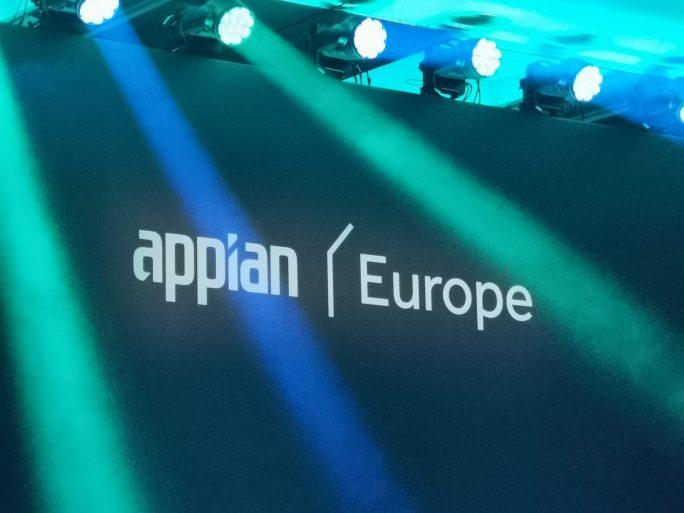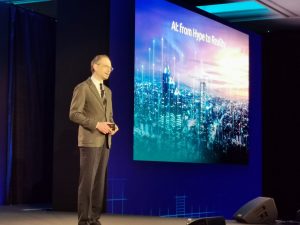Appian: “AI Should Be Seen as a Team Member, Not a Replacement for Humans”

The Appian Europe conference showcases the company’s advances in artificial intelligence, which is increasingly integrated into data and process management.
The Appian Europe 2023 conference was held last week in London, where the company showcased the latest developments in its platform since this year’s North American edition in San Diego at the beginning of May.
Since then, the software maker has made significant progress in unified data and artificial intelligence, the keys to enabling organisations to extract true value from the information they manage. And the problem they currently face is that a lot of data is going to waste. It’s there, but if it’s not processed properly it’s as if it doesn’t exist, as Matt Calkins, CEO of Appian, said during his speech at Appian Europe:
“Today, most data is wasted. This is something I often say. Most of the data that organisations know about is not being used properly because it is not connected. The moment a customer calls your call-centre is when you need to know everything about that customer. If you can’t get their data in 10 seconds while you’re talking to them, it’s as if that information doesn’t exist and, as a consequence, you’re not offering them a good service”.

Indeed, at this point the data that organisations are dealing with is of less value because it cannot be accurately understood. It is stored somewhere but it is not being properly cross-referenced with other data, something that would allow valuable insights to be drawn.
Appian wants to mitigate these limitations through a powerful combination: unified data and artificial intelligence.
On the one hand, Appian Data Fabric is offering organisations the ability to unify their data in a way that is independent of its location and format. It is able to integrate all that information in a logical way so that it is available on the same dashboard.
On the other hand, the AI that the company is implementing helps to extract knowledge from that data in real time thanks to appropriate and personalised training for each type of business.
Matt Calkins, CEO of Appian: “I started writing artificial intelligence code 30 years ago. But it was terrible because it couldn’t learn from data, there was no way it could process large volumes of corporate information. Fortunately, that has completely changed today because we can now teach AI with all that data and with the computational power that the cloud provides.”
According to Calkins, it’s a two-way process in the sense that users won’t be able to provide the data to AI and forget about it, but will have to work together: “We’re going to give tasks to AI and then we’re going to check the results returned. AI should be seen as a member of the team and not as a replacement for humans”.
In this sense, the head of the company offers a reassuring message regarding artificial intelligence as long as it is used appropriately.
![]() Appian Data Fabric is enjoying widespread adoption by the company’s customers. Sixty-six percent of all customers are already using it, while the rate of adoption by new customers is much higher, at 93 percent.
Appian Data Fabric is enjoying widespread adoption by the company’s customers. Sixty-six percent of all customers are already using it, while the rate of adoption by new customers is much higher, at 93 percent.
As of today, as Calkins says, the platform has already executed four billion queries on organisations’ data. And this is the key for artificial intelligence to be truly efficient and add value: the data it has access to.
“Personally, I started writing artificial intelligence code 30 years ago. But it was terrible because it couldn’t learn from data, there was no way it could process large volumes of corporate information. Fortunately, that has completely changed today because we can now teach AI with all that data and with the computational power that the cloud provides. Appian Data Fabric has been developed with this in mind,” Calkins said in a subsequent media briefing.
When it comes to generative artificial intelligence, Appian was one of the first companies to coin the term “Private AI”. Calkins is clear that the fact of making use of public models of generative AI (ChatGPT is on everyone’s lips) can jeopardise the integrity and privacy of corporate data, so he is betting on the development of private AI, those in which the algorithms only have access to the data of each organisation and are not shared with third parties.
From his point of view, the fact that AI has access to limited data is not a problem, but quite the opposite, because in the end it will be learning exactly from the data that each business is interested in and not others. In this way, generative AI algorithms will learn to solve questions much more efficiently and accurately.
“For us, the future lies in applying AI to specific situations, to niche problems. Developing and training AI to be good in that field that each company is in,” Calkins said.
To achieve this, Appian is also working with OpenAI to develop its own copilot – Appian Copilot – which will provide an AI assistant for its platform to privately access data without sharing it with anyone, yet specialise in returning accurate results.
![]()
This private AI offers additional features of equal importance, such as greater control. “Private AI can be auditable in case we are not convinced by a result or it is wrong because it is possible to access the information it has used for its response,” he added.
Another conversation focuses on compliance, where generative AI tools such as ChatGPT can expose the data that companies hold on their customers and break the law and be fined for doing so. The use of private AI makes it easier for organisations to adapt to regulations in each region. As we already know, data protection laws vary significantly depending on the country of operation.
Growing interest in AI in Spain
As is customary at Appian conferences where Silicon has been present, this writer had the opportunity to chat with the company’s Spanish executives, led by Miguel Ángel González, vice-president for Iberia, LATAM and, more recently, Italy.
“We have mastered the data and the processes. Now we are starting to understand how to better and increasingly implement AI. In six months we have changed our approach to be more present in this area”, began González, referring to predictive or traditional artificial intelligence.
Everything seems to indicate that this field will be marked in any case by the data privacy explained above, in such a way that organisations ensure their integrity and comply with current regulations.
In Spain, says González, there is growing interest in the adoption of the three areas in which Appian is moving: data, processes and artificial intelligence.

“The result of this is that we are winning more and more accounts and closing deals, such as contracts with public administrations thanks to this combination. As of today, we are the largest -niche- automation integrator in our country”, the executive continued.
Indeed, in the case of Appian, everything starts with the optimisation of business processes, which is really the origin of the company. As time has gone by, the manufacturer has been able to combine this speciality with the management of data, people and, finally, artificial intelligence.
“In many cases, it is the customers who are making use of the process automation we provide who ask us about implementing AI into that automation. It is the next step to further optimise processes and facilitate users’ daily work. AI can interact in our platform much more than we thought, it is the ideal complement and a member of the teams,” Gonzalez concluded.